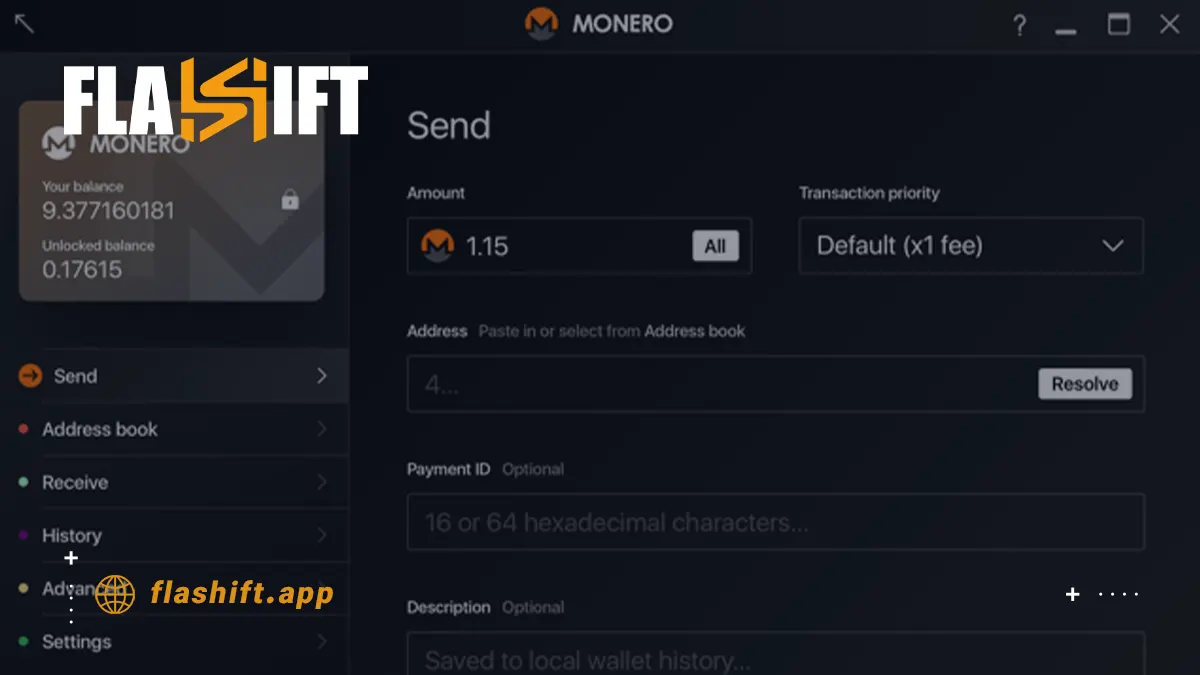- Introduction to Monero and Transaction Private Keys
- Why Access Your Monero Transaction Private Key?
- Methods to Access Your Monero Transaction Private Key
- Using Monero GUI Wallet to Retrieve Transaction Private Key
- How to Retrieve a Transaction Private Key via Monero CLI
- Step-by-Step Guide for Viewing Transaction Keys in Your Wallet
- How to Use Your Monero Transaction Private Key for Payment Proofs
- Decoding Monero Transactions and the Importance of Private Keys
- Verifying Monero Transactions with a Private Key
- Troubleshooting: Common Issues with Monero Private Keys
- Tips to Protect Your Monero Wallet and Private Keys
- Advanced: Extracting Private Keys with Third-Party Tools
- FAQ
Monero, a privacy-enabled cryptocurrency, has a set of strong features that enable secure and anonymous transactions. Among the various parts of its security model, the transaction private key plays an important role in verifying transactions and proving ownership. Whether you’re troubleshooting a transaction issue, verifying payment details, or simply exploring Monero’s privacy mechanisms, understanding how to access your transaction private key is essential.
This guide will explain what a Monero transaction private key is, why it is important, and go step by step on how one can retrieve it securely. Whether you’re an old-time user or a newcomer to Monero, this guide will help you do so in a clear manner with full confidence.
Introduction to Monero and Transaction Private Keys
What is Monero?
Monero is an open-source, leading cryptocurrency that has been designed keeping privacy and security in mind. Unlike many other cryptocurrencies, Monero provides the assurance of making transactions untraceable and unlinkable; it is a major reason why people with a penchant for financial privacy use this digital currency. Monero achieves this through advanced cryptographic techniques like ring signatures, stealth addresses, and confidential transactions.
The Role of Private Keys in Monero’s Privacy Features
Private keys are essential to Monero’s functionality and privacy guarantees. In Monero, a private key not only secures ownership of funds but also plays a critical role in transaction verification and confidentiality. For instance, the transaction private key is a unique, one-time-use key generated during a transaction. It ensures that the recipient can confirm the origin of the payment without exposing any sensitive information to external observers.
Why Access Your Monero Transaction Private Key?
Accessing the transaction private key may be necessary in scenarios like payment verification, resolving disputes, or auditing purposes. This key is typically stored securely within your Monero wallet, and accessing it requires specific steps to ensure its safety and the privacy of your funds.
Understanding Monero Transaction Keys
Monero is renowned for its privacy features, and its transaction system is a cornerstone of this anonymity. Among its critical components is the Monero transaction private key, a unique cryptographic element that ensures the security and confidentiality of transactions.
What is a Transaction Private Key in Monero?
A transaction private key in Monero is a one-time-use private key generated when you send funds. It serves as a proof of payment, allowing the recipient to verify the origin of the transaction without compromising the sender’s or recipient’s privacy. This key is distinct from the wallet’s primary private keys and is tied specifically to the transaction in question.
Why Are Transaction Keys Important?
Transaction keys play a pivotal role in Monero’s privacy and security ecosystem. They ensure:
- Verification of Payments: Recipients can use the transaction private key to confirm that the payment was sent and received correctly.
- Enhanced Privacy: By utilizing unique keys for each transaction, Monero minimizes the risk of linking transactions to a single source.
- Dispute Resolution: In cases where payment verification is required, providing the transaction private key can help resolve disputes while maintaining confidentiality.
Protecting Monero Private Keys
To ensure the integrity of your Monero funds and transactions, it is vital to safeguard your private keys. Always:
- Use a secure and trusted wallet to manage your Monero.
- Store backup keys offline to prevent unauthorized access.
- Avoid sharing private keys unless absolutely necessary, and only with the intended recipient for verification purposes.
By understanding the use of the Monero transaction private key and its role in maintaining privacy, you can better appreciate Monero’s robust security model and take proactive steps to protect your financial information.
Methods to Access Your Monero Transaction Private Key
Retrieving your Monero transaction private key is essential for payment verification and maintaining transparency without sacrificing privacy. Monero wallets, both GUI and CLI, provide tools to access these keys securely. Here’s a detailed guide on how to retrieve and use these keys while safeguarding them.

Using Monero GUI Wallet to Retrieve Transaction Private Key
The Monero GUI wallet provides an intuitive way to access your transaction private key. Follow these steps:
- Open Your Wallet: Launch the Monero GUI wallet and log in.
- Go to Transactions: Navigate to the “History” tab to view your past transactions.
- Select a Transaction: Click on the specific transaction for which you need the private key.
- Retrieve the Key: Locate the transaction details, and click the option to “Show key” or “View transaction private key.”
- Record Safely: Copy the key and store it in a secure location, ensuring it’s not exposed to unauthorized access.
How to Retrieve a Transaction Private Key via Monero CLI
The Monero CLI wallet is a powerful tool for advanced users. To retrieve your transaction private key:
- Launch CLI Wallet: Open your Monero CLI wallet and connect to the network.
- View Transaction Details: Use the command show_transfers to list recent transactions.
- Retrieve the Private Key: Execute the get_tx_key <transaction_hash> command, replacing <transaction_hash> with the hash of the desired transaction.
- Secure the Key: Note down the key and ensure it is stored safely, away from prying eyes or potential cyber threats.
Step-by-Step Guide for Viewing Transaction Keys in Your Wallet
-
- Identify the Transaction: Know the transaction hash or ID for which you want to retrieve the private key.
- Choose the Tool: Decide between using the Monero GUI wallet (user-friendly) or CLI wallet (advanced).
- Execute Commands or Access Options: Depending on your tool, follow the specific steps above to locate the key.
- Backup and Protect: Save the transaction key securely, ideally in an offline or encrypted format.
How to Use Your Monero Transaction Private Key for Payment Proofs
If you ever need to provide evidence that you have made a Monero payment—such as for resolving a dispute with a merchant or confirming a deposit—the transaction private key becomes essential. You can share the transaction private key with the recipient. Using Monero’s built-in tools (like the check_tx_key command in the GUI or CLI wallet), the recipient can independently verify that the payment was indeed sent to their address, all without revealing your wallet balance or other private transactions. For a detailed walkthrough, check our guide on how to verify Monero transactions.
Always share this key securely and only with trusted parties, as it is designed for limited, specific-proving purposes and does not compromise your main wallet privacy.
Decoding Monero Transactions and the Importance of Private Keys
Transaction private keys are critical for decoding Monero transactions without compromising your privacy. They ensure that recipients can verify payments securely while preventing unauthorized access to your wallet. Protecting Monero private keys is paramount to maintaining the integrity of your funds and privacy. Always use trusted wallets and avoid exposing your keys unnecessarily.
By understanding how to retrieve your Monero wallet keys and the role of private keys in Monero, you can confidently navigate the Monero ecosystem while ensuring your transactions remain secure.
To exchange Tether to Monero in one second, try Flashift.
Verifying Monero Transactions with a Private Key
Monero’s transaction privacy is one of its standout features, ensuring anonymity for both sender and receiver. However, there are situations where verifying a transaction’s authenticity becomes necessary. The Monero transaction private key plays a crucial role in this process. This guide will walk you through using the private key for verification and the tools available to simplify the process.
How to Use a Transaction Private Key for Transaction Verification
-
-
- Obtain the Transaction Details:
- Locate the transaction hash (ID) and the corresponding private key.
- The transaction hash is a unique identifier for the specific transaction, while the private key enables verification.
- Share Key with the Recipient (if applicable):
- Provide the transaction private key to the intended recipient if they need to confirm the payment.
- Sharing the key only with the recipient ensures Monero’s transaction privacy is upheld.
- Verify Using a Wallet:
- Monero CLI Wallet: Use the check_tx_key <tx_hash> <tx_key> <address> command, replacing placeholders with your transaction hash, private key, and recipient’s address. The wallet will confirm whether the transaction has been received.
- Monero GUI Wallet: The GUI wallet may have a built-in verification feature, typically under “Advanced” or “Transaction Verification.”
- Obtain the Transaction Details:
-
Tools and Platforms for Verifying Monero Transactions
Several tools are available to assist in transaction verification:
-
-
- Monero Wallets:
- Both CLI and GUI wallets offer built-in commands or interfaces to verify payments.
- These tools ensure verification is performed securely within the wallet environment.
- Third-Party Services:
- Use trusted Monero explorers or verification platforms that support transaction verification with privacy in mind.
- Be cautious when using external services to avoid compromising sensitive information.
- Open-Source Tools:
- Community-developed software designed for Monero verification can be useful, especially for advanced users.
- Monero Wallets:
-
The Role and Importance of Transaction Private Keys
The use of a Monero transaction private key is essential for:
-
-
- Confirming payments without revealing unnecessary details.
- Maintaining the anonymity of sender and receiver.
- Verifying transactions independently in disputes or auditing scenarios.
-
Protecting Your Transaction Private Keys
-
-
- Never share keys publicly: Only share with trusted parties for specific purposes like verification.
- Secure storage: Keep keys encrypted or offline to prevent unauthorized access.
- Recovering lost keys: Use your Monero wallet’s backup or recovery methods to retrieve the keys if needed.
-
By understanding how to verify Monero transactions with a private key and leveraging the right tools, you can ensure transparency while preserving the robust privacy features Monero is known for.
Troubleshooting: Common Issues with Monero Private Keys
Monero’s privacy-focused architecture relies on private keys to secure crypto transactions and verify payments. However, losing or being unable to locate your Monero transaction private key can be a frustrating experience. This guide will help you troubleshoot common issues, explain recovery options, and provide tips for preventing the loss of private keys in the future.
What to Do if You Can’t Find Your Transaction Private Key
-
-
- Check Your Monero Wallet:
- Monero GUI Wallet: Navigate to the transaction history and select the specific transaction. Look for the option to view or export the transaction private key.
- Monero CLI Wallet: Use the get_tx_key <transaction_hash> command, replacing <transaction_hash> with the ID of the transaction.
- Ensure Wallet Access:
- Confirm you are using the correct wallet and that it is fully synchronized with the Monero blockchain. Missing keys may be linked to an incomplete synchronization.
- Backup Restoration:
- If you have a backup of your Monero wallet, restore it to access the transaction private key. Wallet backups typically include all private keys associated with your transactions.
- Transaction Key Not Available:
- If you cannot find the key, it may not have been saved by the wallet or was deleted accidentally. Unfortunately, without the key, verification for that transaction becomes impossible.
- Check Your Monero Wallet:
-
Preventing Loss of Private Keys in Monero
-
-
- Always Backup Your Wallet:
- Ensure regular backups of your Monero wallet file (e.g., wallet.keys).
- Store backups in a secure, offline location to protect against data loss or theft.
- Enable Key Exporting:
- Periodically export transaction private keys for critical payments and store them securely.
- Use the wallet’s export functionality or manually retrieve and save keys when needed.
- Organize and Secure Keys:
- Maintain a secure, encrypted record of your transaction private keys. Use a password manager or encrypted file storage solution for long-term key storage.
- Use Trusted Wallets:
- Stick to official Monero wallets or reputable third-party wallets that support Monero’s transaction privacy features.
- Always Backup Your Wallet:
-
Monero Private Key Recovery and Extraction
If you lose access to your Monero private keys, you can attempt the following steps:
-
-
- Restore Wallet from Seed: Use your 25-word Monero seed phrase to regenerate your wallet, including all private keys.
- Extract Keys Manually: With wallet access, use commands like export_key_images or get_tx_key in the CLI wallet to retrieve specific keys.
-
Ensuring Monero Transaction Privacy
Monero’s transaction privacy ensures that even in scenarios involving private key extraction or recovery, your transactions remain untraceable. Following best practices for key management and wallet backups can protect your funds while retaining the flexibility to verify payments when needed.
By adhering to these troubleshooting and prevention tips, you can confidently manage and secure your Monero transaction private keys, ensuring both privacy and accessibility.
Security Considerations for Monero Private Keys
Protecting your Monero private keys is integral to maintaining the safety of one’s funds and the privacy of transactions. These keys form the basis of the security in Monero, and their misplacement or leak might result in the loss of funds or a blow to privacy. This how-to guide presents some very workable tips on protecting a wallet from scams and thus securing private keys.
Tips to Protect Your Monero Wallet and Private Keys
-
-
- Use Official Wallets:
- Always download wallets from the official Monero website or trusted sources. Avoid third-party wallets unless thoroughly vetted by the community.
- Secure Backups:
- Regularly back up your wallet, including the .keys file and 25-word mnemonic seed.
- Store backups offline in a secure location, such as an encrypted USB drive or hardware wallet.
- Enable Encryption:
- Encrypt your wallet with a strong, unique password. This adds an extra layer of protection against unauthorized access.
- Update Wallet Software:
- Keep your wallet software updated to benefit from the latest security patches and features.
- Cold Storage:
- For large holdings, consider storing your Monero in a cold wallet that is not connected to the internet.
- Use Multi-Factor Authentication (MFA):
- If available, enable MFA for any account or service associated with your Monero usage.
- Use Official Wallets:
-

Avoiding Scams and Key Phishing Attempts
-
-
- Be Wary of Phishing Sites:
- Always verify the URL of websites related to Monero wallets or transactions. Avoid clicking on suspicious links from emails or messages.
- Never Share Keys:
- Your Monero private keys, including transaction private keys, should never be shared publicly or with untrusted parties. Sharing these compromises the security of your wallet.
- Avoid Fake Support Offers:
- Scammers often pose as customer support and request your private keys. Legitimate Monero support will never ask for this information.
- Double-Check Payment Verifications:
- When verifying a payment using a Monero transaction private key, ensure the recipient’s address and transaction details are accurate.
- Beware of Free Wallet Tools:
- Avoid using wallet tools or services that promise “free key recovery” or other unusual features. These could be malicious programs designed to steal your keys.
- Be Wary of Phishing Sites:
-
Monero Transaction Private Key Recovery Best Practices
-
-
- Recover Using Official Tools:
- If you lose access to your keys, rely on the official Monero GUI or CLI wallets to restore them using your seed phrase.
- Use the get_tx_key command for transaction-specific key recovery when needed.
- Audit Your Backup Process:
- Periodically test your wallet backups to ensure they work correctly. This prevents surprises during critical recovery scenarios.
- Recover Using Official Tools:
-
By following these tips, you can effectively protect your Monero private keys and wallet, ensuring your transactions remain private and your funds secure. Staying vigilant against phishing and scams is critical in maintaining Monero’s robust security and privacy features.
Advanced: Extracting Private Keys with Third-Party Tools
Using Blockchain Explorers to Verify Transactions
Blockchain explorers can be useful for verifying Monero transactions, providing a detailed overview of transaction hashes, timestamps, and outputs. However, due to Monero’s privacy-focused design, most explorers cannot reveal sensitive transaction details unless you use your Monero private key for verification. When using a Monero blockchain explorer, ensure that the platform is trusted and does not compromise your transaction privacy or expose your private keys unnecessarily.
Are Third-Party Tools Safe for Monero Private Key Extraction?
The safety of third-party tools for Monero private key extraction depends on the tool’s reputation and how it handles sensitive data. Trusted, open-source tools can provide secure methods for key extraction when used correctly. However, many third-party tools pose significant risks, including phishing attempts and malware. For maximum security, rely on official Monero wallets for managing and extracting private keys, and avoid sharing your keys with unverified platforms. Always prioritize tools that align with Monero’s privacy ethos.
FAQ
-
-
- What is a Monero transaction private key?
A Monero transaction private key is a unique cryptographic key generated for each transaction when you send Monero (XMR). It allows the recipient to verify the origin of the payment without exposing sensitive information, ensuring privacy and security. - How can I retrieve a Monero transaction private key?
You can retrieve your transaction private key using either the Monero GUI or CLI wallet. In the GUI wallet, it is accessible under the transaction history details. In the CLI wallet, use the get_tx_key <transaction_hash> command with the specific transaction hash to retrieve the key. - Why is the transaction private key important?
The transaction private key is critical for payment verification. It enables the recipient to confirm the payment’s authenticity and ensures transparency in resolving disputes, all while maintaining Monero’s transaction privacy. - Can I recover a lost transaction private key?
If your wallet is intact, you can recover the transaction private key using the wallet’s commands or interface. However, if the key was not saved and you do not have wallet backups, it cannot be recovered, as Monero does not store these keys externally for security reasons. - Is it safe to share my Monero transaction private key?
Sharing a transaction private key is safe only when done with trusted parties for verification purposes. Avoid sharing it publicly or with untrusted individuals, as this could compromise the confidentiality of the transaction. Always handle private keys with care to preserve your financial privacy.
- What is a Monero transaction private key?
-







